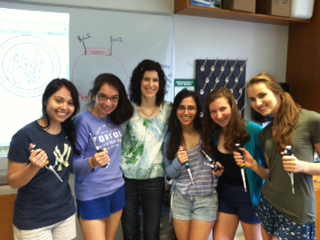Team:Dalton School NY
From 2012hs.igem.org
- a team description
- project description
- safety information (did your team take a safety training course? were you supervised in the lab?)
- team attribution (who did what part of your project?)
- lab notebook
- sponsor information
- other information
Example: 2012hs.igem.org/Team:Dalton_School_NY/Our_Pets
| You can write a background of your team here. Give us a background of your team, the members, etc. Or tell us more about something of your choosing. | |
|
Tell us more about your project. Give us background. Use this as the abstract of your project. Be descriptive but concise (1-2 paragraphs) | |
| Team Dalton_School_NY |
| Official Team Profile |
|---|
Contents |
Team
Students in the Advanced Biotechnology and Molecular Biology course at The Dalton School are collaborating with scientists and students at Johns Hopkins University on their effort to construct a synthetic yeast genome. The short term-goals of this project are to construct large libraries of promoters, protein-coding sequences, and terminators that can be easily combined to form functional genes. Dalton students are cloning 30 promoters as part of this effort. In addition, we are also cloning the protein-coding sequences for 6 fluorescent proteins that can eventually be combined with the promoters to test the strength of the promoters. After constructing genes, the individual genes can be assembled into synthetic yeast chromosomes. The long-term goal of the Hopkins Build-A-Genome initiative is to be able to engineer yeast that can be used to solve human problems including combating world hunger, producing alternative sources of fuel, and studying human disease pathways in a simplified system. For example, last year, Hopkins students inserted all of the enzymes necessary to produce vitamin A into yeast. These yeast can be used to bake bread containing vitamin A to supplement the diets of malnourished people. Johns Hopkins iGEM 2011
Project
Notebook
Results/Conclusions
What did you achieve over the course of your semester?
Safety
What safety precautions did your team take? Did you take a safety training course? Were you supervised at all times in the lab?
Attributions
Who worked on what?
Human Practices
What impact does/will your project have on the public?
Sponsors
We are very appreciative of our sponsors!
<forum_subtle />
 "
"
